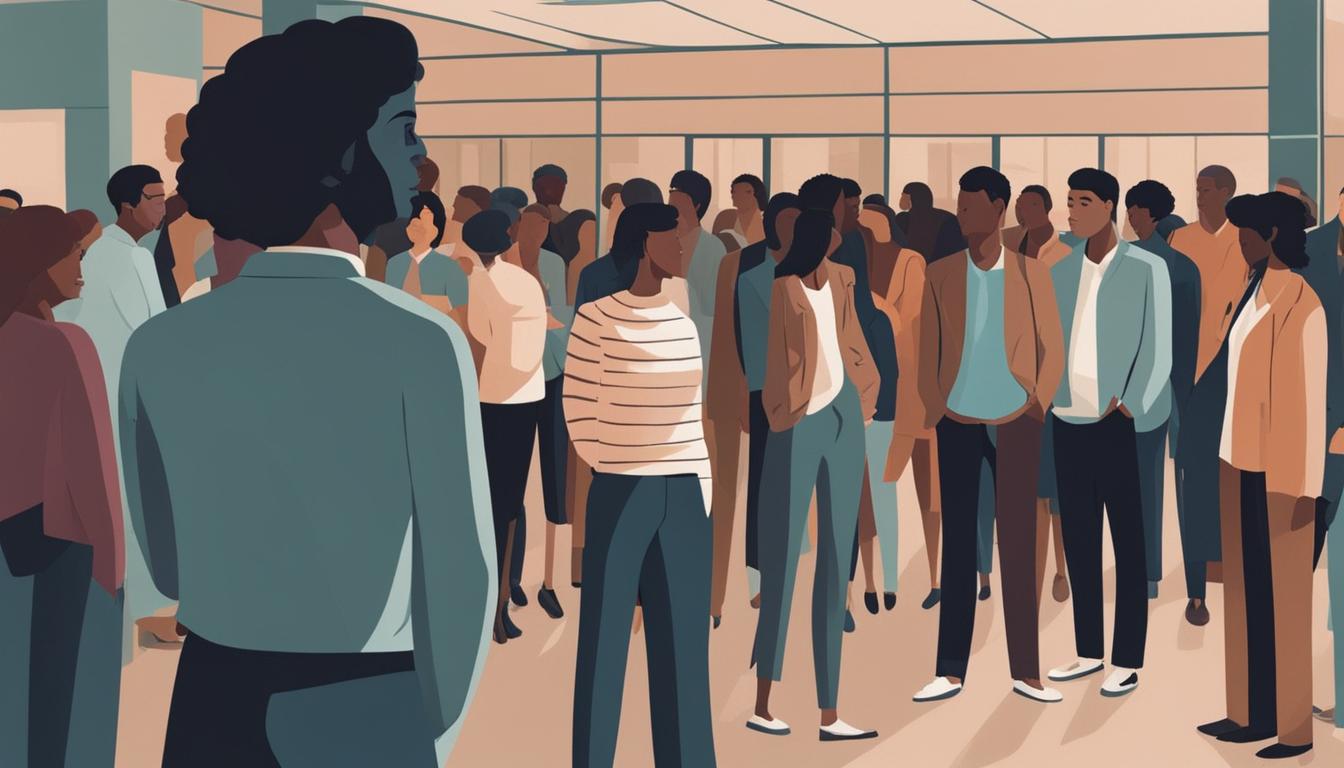Welcome to the ultimate guide to everything you need to know about best friends. Best friends are an essential part of our lives, providing us with support, companionship, and laughter. In this guide, we will delve into the top qualities of a best friend, explore how to be a best friend, discuss the importance of having a best friend, and provide tips for building a strong bond and maintaining a healthy best friend relationship. Whether you are searching for a new best friend or looking to enhance your existing friendship, this guide is here to help.
- Best friends offer support, companionship, and laughter.
- Top qualities of a best friend include loyalty, trustworthiness, and empathy.
- Being a best friend involves being there for one another and actively listening.
- Having a best friend is important for emotional well-being and reducing loneliness.
- Building a strong bond with your best friend requires time, effort, and shared experiences.
Why Is Making a Best Friend So Difficult?
Making a best friend can be challenging, especially as an adult. There are several reasons why it can be difficult to make new friends in today’s busy world. One of the main challenges is the lack of time for socializing due to work and family responsibilities. The demands of our daily lives often leave little room for meeting new people and nurturing friendships.
Additionally, the absence of supportive environments can make it even harder to form meaningful connections. In school, we had structured settings that facilitated interaction and provided opportunities to meet new friends. However, as adults, we often lack these built-in social environments.
Despite these challenges, it’s important to remember that making friends as an adult is still possible. It may require more effort and intentionality, but the rewards of finding a true best friend are worth it.

Why You Need a Best Friend
Having a best friend is incredibly important, not just for social reasons, but for our overall well-being. Research has shown that a best friend can have a significant impact on our mental health, providing us with emotional support, stress reduction, and a sense of belonging.
One of the key benefits of having a best friend is the reduction of loneliness and isolation. In today’s fast-paced and digital world, it’s easy to feel disconnected from others. Having a close friend who understands and supports us can help alleviate these feelings of loneliness and improve our mental well-being.
“A best friend is someone who knows all about you and still loves you.” – Elbert Hubbard
A best friend is like a pillar of support in our lives. They offer a listening ear, comforting words, and unwavering support during challenging times. Whether we’re dealing with stress at work, relationship problems, or personal struggles, a best friend provides a safe space where we can express ourselves without fear of judgment.
It’s been scientifically proven that having a best friend can actually help reduce stress. When we spend time with a close friend, our bodies release oxytocin, a hormone that promotes feelings of relaxation and contentment. Simply being in the presence of a trusted friend can help us unwind and recharge.

Having a best friend also provides us with a sense of emotional stability and security. Knowing that we have someone we can rely on, confide in, and lean on during both good times and bad creates a deep sense of emotional support. This support can have profound effects on our mental health and help us navigate life’s challenges with greater resilience.
So, if you haven’t yet found your best friend, don’t hesitate to prioritize building and nurturing friendships. The importance of having a best friend cannot be overstated. From reducing loneliness and stress to providing emotional support, a best friend is truly a precious gift that enriches our lives in countless ways.
How to Make a Best Friend
Making a best friend is a meaningful journey that requires both effort and thoughtful strategies. Whether you are looking to expand your social circle or deepen an existing connection, these tips will guide you on the path to forming a strong and lasting friendship.
1. Encourage and Listen
One of the key ingredients in making a best friend is being an active and attentive listener. Show genuine interest in what the other person has to say, ask follow-up questions, and provide encouragement and support. By actively listening, you create a safe space for the other person to open up and share their thoughts and feelings.
2. Willingness to Open Up
Building a close friendship often requires vulnerability and trust. Be willing to open up about your own experiences, emotions, and opinions. Sharing personal stories and feelings can help forge a deeper bond and create an atmosphere of mutual understanding and empathy.
3. Platonic Touch
Physical touch can play a significant role in enhancing friendship bonds. Platonic touch, such as hugs or a friendly pat on the back, can convey warmth, affection, and support. However, it’s important to respect personal boundaries and ensure that both parties are comfortable with physical interactions.

4. Shared Experiences
Shared experiences provide a solid foundation for friendship. Engage in activities that you both enjoy, such as hobbies, sports, or volunteering. Creating memories together strengthens your connection and gives you something to reminisce about in the future.
5. Maintaining a Friendship
Once you have established a friendship, it’s crucial to nurture and maintain it. Regularly spend quality time together, communicate openly and honestly, and be supportive during both good and challenging times. A strong friendship requires effort and dedication from both parties.
Remember, making a best friend takes time, patience, and genuine interest. By following these tips and investing in the friendship, you can create a bond that lasts a lifetime.
About Men’s Group
Men’s Group is an online support platform that provides men a safe space to connect with others and build meaningful friendships. With a diverse range of men’s forums and groups, this platform offers a supportive community where men can share their experiences, seek advice, and offer guidance.
Joining a men’s group provides numerous benefits for individuals seeking online support. The interactive forums allow users to engage in discussions and receive valuable insights from others who have faced similar challenges. Men’s Group also facilitates online meetings, providing a virtual space for men to connect in real-time.
“Men’s Group has been a game-changer in my life. I was able to find a supportive community of like-minded individuals who have helped me navigate various aspects of my life. From discussing personal relationships to career advice, this group has provided me with the support I needed.”
Whether you are looking for tips on making a best friend or simply want to connect with like-minded men, Men’s Group offers a valuable resource. The online support and camaraderie found within this platform can contribute to personal growth, increased self-awareness, and a sense of belonging.
Qualities of a Good Friend
A good friend is an invaluable asset, enriching our lives with their presence. They possess certain qualities that make the friendship strong and meaningful. Let’s explore the top qualities that define a good friend:
Integrity
Integrity is a fundamental quality of a good friend. They are honest, trustworthy, and consistently act with moral principles.
Dependability
A good friend is dependable, always being there for you when you need them. They can be relied upon to keep their promises and offer support.
Loyalty
Loyalty is a vital quality in a good friend. They are faithful, standing by your side through thick and thin, unwavering in their support.
Empathy
A good friend possesses empathy, the ability to understand and share the feelings of others. They offer genuine compassion and support in times of need.
Good Listener
A good friend is a good listener. They lend a sympathetic ear, allowing you to express yourself without judgment and providing a safe space to share your thoughts and emotions.
Confidence
Confidence is an important quality in a good friend. They encourage and inspire you to believe in yourself, boosting your self-esteem.
Positive Influence
A good friend has a positive influence on your life. They motivate and inspire you to be your best self, encouraging personal growth and development.
Sense of Humor
A good friend possesses a sense of humor, bringing joy and laughter into your friendship. They lighten the mood and remind you to enjoy life’s lighter moments.
Non-judgmental Attitude
A good friend is non-judgmental, accepting you for who you are without criticism or condemnation. They create a safe environment where you can express yourself authentically.

These qualities are essential for building and maintaining a healthy friendship. When you find someone who embodies these qualities, cherish and nurture the bond you share. Surround yourself with good friends who uplift and support you, and be the kind of friend you would like to have.
Spotting a Bad Friend
Not all friendships are healthy and beneficial. It’s important to be able to identify the signs of a bad friend to maintain healthy and positive relationships.
1. Lack of Trustworthiness:
A bad friend may consistently break promises, betray your trust, or share your secrets without your consent.
2. Taking Advantage:
A bad friend may constantly seek personal benefits without considering your feelings or needs.
3. Lack of Loyalty:
A bad friend may not stand up for you, criticize you behind your back, or prioritize their own interests over your friendship.
4. Lack of Empathy:
A bad friend may not show understanding or compassion towards your struggles, dismissing your feelings or belittling your experiences.
5. Poor Listening Skills:
A bad friend may not actively listen when you talk, interrupting or dismissing your thoughts, opinions, or emotions.
6. Lack of Confidence:
A bad friend may constantly bring you down, undermine your self-esteem, or not support your goals and aspirations.
7. Negative Influence:
A bad friend may encourage you to engage in harmful behaviors, such as substance abuse or negative relationships.
8. Constant Negativity:
A bad friend may consistently have a negative attitude, bringing down the mood and energy of the friendship.
9. Judgmental Behavior:
A bad friend may constantly criticize and judge you, your choices, or your lifestyle, making you feel insecure or unworthy.
By being aware of these red flags, you can protect yourself from toxic friendships and surround yourself with positive and supportive people who enrich your life.

The Importance of Good Friendship
Good friendship plays a vital role in overall well-being. Having strong and genuine connections with others brings numerous benefits to our lives, both emotionally and physically.
One of the key aspects of good friendship is the social support it provides. Friends are there for us during the ups and downs, offering a listening ear, words of encouragement, and practical help when needed. This support system helps us navigate through life’s challenges and enhances our sense of belonging.
The positive impact of good friendship on our emotional well-being should not be underestimated. True friends can be a source of comfort and happiness, bringing joy and laughter into our lives. They provide a safe space where we can express ourselves freely, without fear of judgment, and share our joys and sorrows.
Friendship also plays a crucial role in stress reduction. Having someone who genuinely cares about us and understands our experiences can help alleviate stress and anxiety. Through their presence and support, friends offer a sense of security and reassurance, making it easier for us to cope with the demands of everyday life.
Furthermore, good friendship can contribute to personal growth. Friends challenge us, inspire us, and help us discover new perspectives and opportunities. They provide valuable feedback, help us see our strengths and weaknesses, and encourage us to step outside our comfort zones. Through shared experiences and mutual support, we can learn and grow together.

Research has also shown that good friendship has various health benefits. Strong social connections have been linked to a lower risk of developing certain health conditions, including heart disease and depression. Friends can motivate us to engage in healthy behaviors, such as exercising, eating well, and seeking medical care when needed. Additionally, the emotional support and positive interactions we receive from friends boost our immune system and overall well-being.
Understanding the importance of good friendship can motivate us to invest time and effort in nurturing and strengthening our relationships. By prioritizing and valuing our friendships, we can enjoy the numerous benefits they bring and create a support network that enriches our lives.
How to Find Good Friends
Finding good friends can be a challenge, but it is possible. Building a fulfilling social circle starts with taking proactive steps and being open to new connections. Here are some tips to help you find good friends:
Engage in Communal Activities
Participating in communal activities such as volunteering, joining clubs or organizations, or attending community events can provide opportunities to meet like-minded individuals and forge new friendships. These activities allow you to connect with people who share similar interests and values.
Explore Shared Interests
Discovering and exploring shared interests is another effective way to find good friends. Whether it’s through joining hobbyist groups, attending workshops, or enrolling in classes, engaging in activities that align with your passions can lead you to meet individuals who have similar hobbies and passions.
Join Online Communities or Social Media Groups
In today’s digital age, online communities and social media groups offer a vast network of individuals who share common interests. Joining relevant online communities or groups can help you connect with people from all walks of life, regardless of geographical limitations.

Be Open-Minded and Practice Empathy
Being open-minded is crucial when seeking new friendships. Embrace diversity and be willing to learn from others who may have different backgrounds or perspectives than your own. Additionally, practicing empathy by putting yourself in others’ shoes and understanding their experiences can help foster deeper connections.
Practice Active Listening and Mutual Support
Active listening is key to building strong friendships. Paying attention to what others have to say, showing genuine interest, and offering support when needed can create a sense of trust and understanding. Likewise, being supportive and providing mutual encouragement can strengthen the bond between friends.
By following these tips and implementing these strategies, you can increase your chances of finding good friends who share your interests, values, and goals. Remember, building meaningful friendships takes time and effort, but the rewards are immeasurable.
Conclusion
In conclusion, having a best friend is a valuable and rewarding experience. Throughout this guide, we have explored the importance and benefits of best friends, as well as strategies for building and maintaining strong friendships. Investing in your friendships is crucial for your overall well-being and happiness.
By applying the tips and insights shared in this guide, you can cultivate meaningful relationships and enjoy the many joys of having a best friend in your life. Good friends provide social support, emotional well-being, and help reduce stress. They play a significant role in personal growth, providing a sense of belonging and contributing to your overall health.
Remember to be a good friend to others, demonstrating qualities like trustworthiness, empathy, and loyalty. Actively listen, engage in shared experiences, and provide mutual support. Cherish the friendships you have and be open to making new connections along the way. Building and maintaining friendships takes effort, but the rewards are immeasurable.
FAQ
What are the top qualities of a best friend?
The top qualities of a best friend include integrity, trustworthiness, dependability, loyalty, empathy, being a good listener, confidence, positive influence, sense of humor, and a non-judgmental attitude.
How can I be a best friend?
To be a best friend, you should actively listen, be open to sharing personal experiences, develop a platonic touch, engage in shared experiences, and maintain a healthy and strong friendship.
Why is it important to have a best friend?
Having a best friend is important because they can help reduce loneliness, provide emotional support, act as a stress buster, and allow you to be yourself without judgment.
What are the signs of a true best friend?
Signs of a true best friend include trustworthiness, loyalty, empathy, being a good listener, positive influence, and a non-judgmental attitude.
How can I build a strong bond with my best friend?
To build a strong bond with your best friend, you should invest time and effort, communicate openly and honestly, respect and trust each other, and create shared experiences and memories.
What are the characteristics of a loyal best friend?
A loyal best friend is someone who stands by your side through thick and thin, keeps your secrets, supports you in difficult times, and remains trustworthy and dependable.
How can I maintain a healthy best friend relationship?
To maintain a healthy best friend relationship, you should communicate regularly, resolve conflicts peacefully, support each other’s goals, respect boundaries, and show appreciation and gratitude.
What are the benefits of having a best friend?
Having a best friend provides social support, improves your emotional well-being, reduces stress, offers personal growth opportunities, gives you a sense of belonging, and has various health benefits.
How can I find the right best friend?
To find the right best friend, you can engage in communal activities, explore shared interests, join online communities or social media groups, be open-minded, practice empathy and active listening, and offer mutual support.


